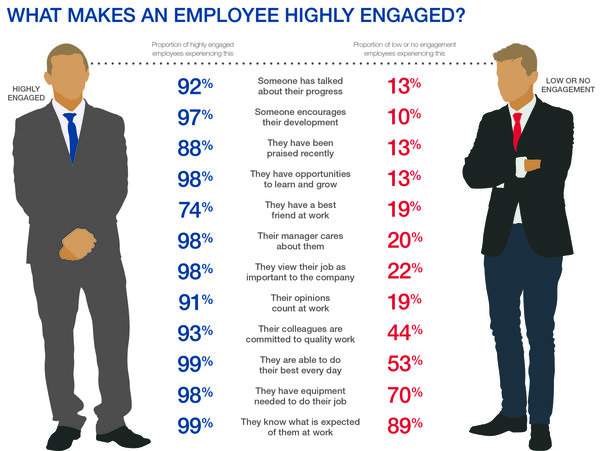Getting wellbeing right
Wellbeing is a topic that has (historically) been dismissed by some employers; those with the attitude of “employees get paid a wage so they must be happy!”
This is, in most cases, due to a lack of knowledge when it comes to the fruitful ‘win-win’ benefits of paying attention to employee wellbeing.
Wellbeing is defined as “the state of feeling healthy and happy”. This may all sound a little 1970’s ‘hippie’, however, there are growing catalogues of research that stress the importance of the wellbeing concept.
Benefits of wellbeing initiatives
Wellbeing initiatives can genuinely help a business thrive whilst at the same time creating a more positive working environment. According to Forbes (American business magazine) writers, David Sturt and Todd Nordstrom, wellbeing can have a huge impact on staff engagement and productivity – these arguably being key factors to unlocking quality work.
Other benefits mentioned by ‘Mind’ (mental health charity) are that employees take less time off when wellbeing is developed correctly, thereby increasing a business’s success.
According to Bupa ‘UK employees take more time off than any other Western European country’ (suggesting that we work hard but could maybe be looked after better) if employees were more happy and healthy (with their wellbeing considered more proactively by their management teams) then businesses could be less likely to lose their employee services due to absenteeism and illness, giving a direct competitive advantage to the company.
Don’t get it wrong!
Wellbeing is made up of 3 parts;
- Physical
- Social
- Mental
These must be treated in a holistic manner. It is important to construct wellbeing initiatives that include all three of the above, especially mental and social health, ignoring one of them will not address wellbeing appropriately.
It’s important to not fall into the trap of solely focusing on physical wellbeing; it’s highly unlikely that a bowl of fruit will improve someone’s mental or social wellbeing…. Well maybe for some but as a whole, much more needs to be done!
Here are some examples of how companies may address these 3 parts;
- Providing a free gym membership to initiate good physical health. This could have a knock on effect as the gym can provide a good social environment. Training can also enhance confidence and self-esteem in doing so promoting mental wellbeing! (Adidas UK provide gym facilities for their workers)
- Johnson & Johnson who won the award in 2015 for wellbeing at work offer many tools to aid their workforce, one being counselling sessions. This can go a long way to aiding mental health issues.
The companies listed above are obviously big corporate organisations with the funds to use these initiatives (this is no excuse for smaller companies though), there are a variety of different ways to improve wellbeing that won’t bankrupt a company.
Maybe money isn’t everything after all!
‘You get what you pay for’ doesn’t apply to wellbeing as these initiatives don’t have to ‘bust the bank’; for the smaller, less cash rich businesses, simple strategies prove to be just as effective as the more costly ones.
Involving your staff in dialogue and decision-making is proven to be more effective than monetary benefits. According to Mind; (in their wellbeing guide) ‘when employees feel involved and informed about what is happening within the business, it increases motivation and gives a sense of ownership and involvement in key decisions’.
In fact, a staff survey revealed how monetary benefits aren’t everything, when employees had to rank from 1-10 the most important parts of their jobs. (These results may surprise):
- respect
- trust
- development
- environment
- recognition
- communication
- salary
- relaxation
- fun
- happiness
Astonishing results from wellbeing initiatives!
The results of wellbeing initiatives can be incredible as a recent Forbes article highlights the benefits of a well-worked wellbeing plan, below:
- Individual productivity rises 20%
- Companies with poor wellbeing plans only produce an output of 64% compared to those with excellent wellbeing plans producing a staggering 83% of possible work output
- Team productivity is bolstered too, an increase from 61% to 81%
- Job satisfaction doubles: only 44% with poor wellbeing said they were satisfied with their jobs compared to 89% with excellent wellbeing in place
Employees with excellent wellbeing outperform their peers in every area, delivering the best output and quality of work. If every employee in a company is working at this rate due to fantastic wellbeing programmes then the results surely would speak for themselves.
Taking this on here at Johnston Vere
At Johnston Vere, we have an in-house masseur who comes into the office every dress-down Friday offering every member of staff a free massage session for their own individual requirements. Massages are proven to:
- Relax tight and painful muscles to improve motion of the joints, enhance circulation, and lower stress.
- Massages can actually help to improve immune system activity, and play a role in restoring the normal digestive system function by reducing stress. Research conducted by Johns Hopkins Integrative Medicine and Digestive Centre has found that stress suppresses the digestive and immune system.
- They also help to shift thoughts away from worries allowing your body and mind to relax.
During JV Friday meetings, everyone has a chance to voice their ideas. We also have an anonymous suggestion box which empowers staff, allowing us to voice opinions and effect key decisions. This type of consideration, we believe, helps towards a strong, healthy and positive working environment, effectively helping to produce high-quality staff output.
Sir Richard Branson’s balance theory
In a recent interview, Richard Branson discusses wellbeing and states that “choice empowers people to make great decisions” and mentions that flexible working hours give his staff choice. The advice he gave to summarise was “treat staff how you would like to be treated”.
Google, like Richard Branson offer their staff some excellent perks, such as;
- free gourmet food & snacks (basically breakfast lunch and dinner if you stay late enough)
- Massage credits are awarded to employees for strong performance! (these are collected and then used for a 1hr massage on campus)
- Free fitness and gym classes are also available to staff!
- All of the above are outstanding methods to improve wellbeing (Not the most cost conservative methods but I’m sure Google’s got it covered)
Considering wellbeing is not quantum physics, but rather, a simple ‘consideration’, a ‘thoughtful’ and ‘inclusive’ approach to managing human beings, now recognised by the new generation of business leaders who are embracing and proving this, to get the best from their staff, wellbeing is a ‘win-win’ decision. Everytime.

